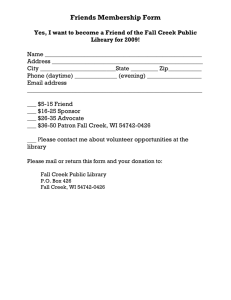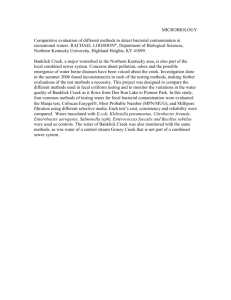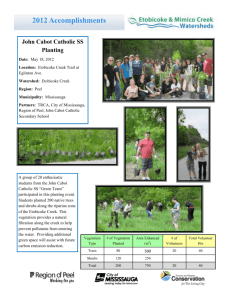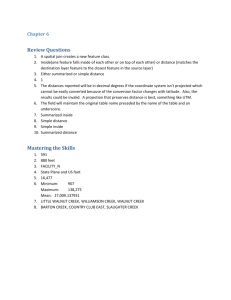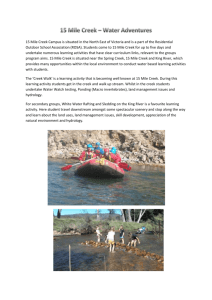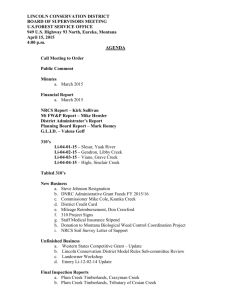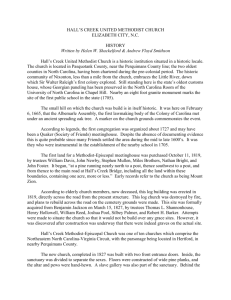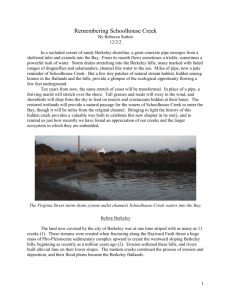Job Safety Analysis - Strawberry Creek
advertisement
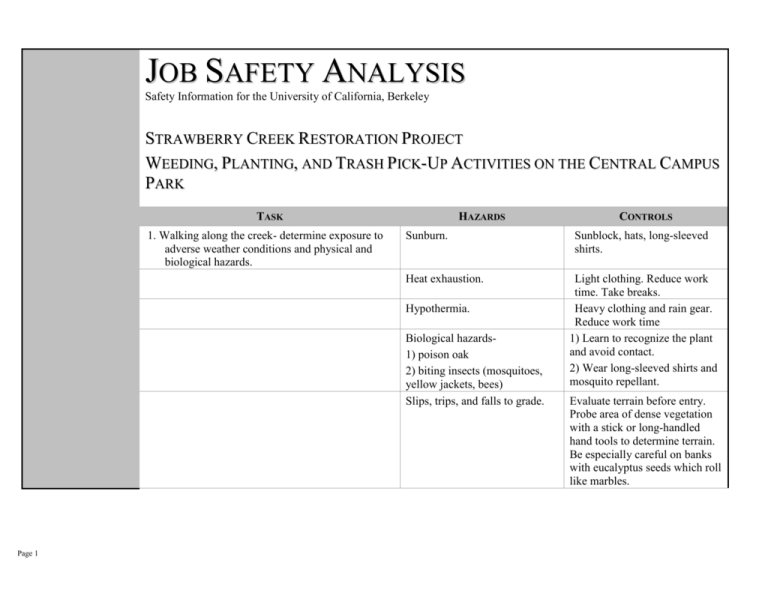
JOB SAFETY ANALYSIS Safety Information for the University of California, Berkeley STRAWBERRY CREEK RESTORATION PROJECT WEEDING, PLANTING, AND TRASH PICK-UP ACTIVITIES ON THE CENTRAL CAMPUS PARK TASK 1. Walking along the creek- determine exposure to adverse weather conditions and physical and biological hazards. HAZARDS Sunburn. Heat exhaustion. Hypothermia. Biological hazards1) poison oak 2) biting insects (mosquitoes, yellow jackets, bees) Slips, trips, and falls to grade. Page 1 CONTROLS Sunblock, hats, long-sleeved shirts. Light clothing. Reduce work time. Take breaks. Heavy clothing and rain gear. Reduce work time 1) Learn to recognize the plant and avoid contact. 2) Wear long-sleeved shirts and mosquito repellant. Evaluate terrain before entry. Probe area of dense vegetation with a stick or long-handled hand tools to determine terrain. Be especially careful on banks with eucalyptus seeds which roll like marbles. Culverts and pipes. Culverts are confined spaces, and while not likely, can contain hazardous vapors and therefore should not be entered. During rainstorms they can fill completely with water. Criminals. Vegetative cover offers protection for criminal activity. 2. Digging into creek sediment and bank soils to weed, plant, or pull up buried trash. Ingestion of or dermal (skin) exposure to soil, water, or debris containing automotive fluids, pesticides, and other organic chemicals, and/ or pathogenic bacteria (from animal feces or sewer overflows). Blunt impact, piercing blows, or cuts to yourself or others from using hand tools. Page 2 Culvert and pipes should not be entered without proper air monitoring equipment and ventilation. Always be aware of your surroundings. If there are suspicious people in a secluded area do not enter it. Work with a partner. Survey the site prior to any planting, weeding, or trash collection activities. Any water contacted should be considered to be contaminated with coliform bacteria, particularly within three days after a rainfall. Hands should be washed with soap and water after contacted creek water prior to eating. Wear personal protective equipment (see below). Keep your eyes open about what others are doing in your area. If you are using tools such as axes or picks that require swinging to provide sufficient impact on the soil or roots, be sure you are clear of someone else and you announce, "swinging" or "heads up" or something similar before you begin. Muscle strain (back strain, repetitive motion strain) Exposure to foot injury from heavy objects (tools such as digging bars, vehicles) 3. Reaching into vegetation to weed or pick up trash. 4. Walking along campus walkways and crossing streets 5. Working during heavy rain. Recommended Additional Reading: Enjoying Strawberry Creek Safely, UC Berkeley EH&S at http://strawberrycreek.berkeley.edu Contributors: Created: JSA Library Number: Page 3 EH&S March 2010 Sharps. Broken glass and discarded sharp metal objects, including needles, can be obscured by vegetation. Muscle strain (back strain, repetitive motion strain) Traffic- collisions with motor vehicles and bicycles. Many roads traverse Strawberry Creek and are used for delivery trucks and bicycles. Flood conditions. During heavy rainfalls the creek can become a deadly torrent. Don't rush. Use tools with the advantage of your weight. Keep the weight of shovelfuls manageable. Steel toed shoes with metal shank arches are required when using equipment that could cause injury to the foot. Operators of motorized vehicles should stay clear of pedestrians. Wear gloves and survey areas by pushing aside leaves before reaching into thick vegetation. Don't rush. Use tools with the advantage of your weight. Keep the weight of shovelfuls manageable. Watch for vehicles when entering paths or intersections. Never enter culverts when rain is forecast. Avoid wading into the creek or slipping in on steep banks during flood conditions. Required Personal Protective Equipment (PPE) 1. Gloves 2. Boots 3. Standard work clothes (coveralls etc. to be used at work only) 4. Wash hands and face when done Page 4
